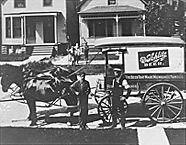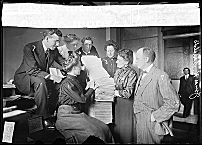| Entries |
| L |
|
Liquor Distribution
|

|
Chicago's retail liquor trade began in 1827, when Samuel Miller and Archibald Clybourne established the Miller House, a store that doubled as the town's first tavern, serving a crude ale as well as some imported beer. By 1837, there were 10 taverns, 26 groceries, many of which sold liquor, and one brewery.

|
Ironically, organized efforts to restrict liquor spurred industry cooperation. In the early 1870s, the “Liberty League,” made up of both dealers and saloonkeepers, was the first organization of liquor dealers in Chicago. In 1880, the Illinois Liquor Dealers Protective Association, the industry's first statewide lobby, was organized. Local interest groups formed at the same time, some at the neighborhood level, including the South Side Saloon Keepers Association and the Hyde Park Liquor Dealers Association.
Even before Prohibition, the liquor industry faced problems. A 1907 act that allowed individual precincts and wards to enact their own prohibition laws led to the forced closure of saloons in two-thirds of the city. Grain conservation regulations during World War I restricted production of alcoholic beverages, and anti-German sentiment made beer drinking unpopular. After passage of the Eighteenth Amendment enacting Prohibition, brewery owners desperately searched for prospective buyers of their establishments. Some brewers, aided by mobsters, continued to produce alcohol illegally. Others turned to the manufacture of nonalcoholic drinks or made ends meet by selling the raw materials that went into liquor production.
After Prohibition, persistent gangster connections and incursions by stronger national corporations into the Chicago market dashed the hopes of local liquor manufacturers for an economic resurgence. A handful of national companies dominated the distilling industry, and wine and beer production eventually became concentrated as well. By 1984, 94 percent of American beer was produced by six companies, none in Chicago.
In the 1930s, aluminum beer cans and nonreturnable bottles, coupled with widespread ownership of refrigerators, allowed consumers to drink cold beer at home. Packaged goods, sold in grocery and liquor stores, soon outstripped tavern sales. Drinking establishments remained but distanced themselves from the ethos of the old saloons. Federal and state legislation aimed to eliminate the “tied house.” Wholesalers became the intermediary between beer, wine, and liquor producers and retailers (grocers, drug stores, taverns, liquor stores). In 1989, the Chicago Beer Wholesalers Association included some 30 wholesalers, each typically with a few dozen employees, each contracting with brewers to distribute exclusively in specified territories. Wine and liquor distribution became extremely concentrated in the 1980s and 1990s. The largest distributor, owned by William Wirtz, had some 1,500 employees in Illinois by 1999, and its operations extended into other states.
The Encyclopedia of Chicago © 2004 The Newberry Library. All Rights Reserved. Portions are copyrighted by other institutions and individuals. Additional information on copyright and permissions.